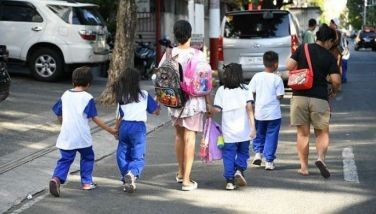Self-rated poverty rises in NCR, Luzon
MANILA, Philippines - Poverty incidence rose in Metro Manila and the rest of Luzon in the past three months, according to results of the Social Weather Stations (SWS)’s recent survey.
The SWS poll, conducted from Sept. 26 to 29, found 43 percent of households in Metro Manila claiming to be poor, up by six points from 37 percent in June.
In balance Luzon, 52 percent of families rated themselves poor, higher than the 45 percent recorded three months earlier. But it dropped by 10 points to 61 percent in Mindanao and nine points to 65 percent in the Visayas.
The SWS explained that overall hunger remained unchanged at 55 percent or about 12.1 million families in the third quarter. “It was three points above the 52 percent average for the four quarters of 2013.”
The SWS third quarter poll also found more families claiming to be “food-poor.”
The SWS said 43 percent of respondents, or about 9.3 million families, considered the type of food they eat as poor. The rate was slightly higher than the 41 percent recorded in the second quarter.
“The latest self-rated food-poverty rate was also four points more than the 39 percent four-quarter average last year,” the pollster said.
Self-rated food poverty also increased by three points in Metro Manila to 30 percent from 27 percent and by five points in balance Luzon to 37 percent from 32 percent.
Self-rated food poverty “hardly changed” in the Visayas, to 53 percent in September from 54 percent in June. It declined by three points to 52 percent in Mindanao.
The self-rated poverty threshold, meanwhile, refers to the monthly budget that poor households need for home expenses in order not to consider themselves poor in general, the SWS said.
The survey research institute reported the self-rated poverty threshold has increased to median of P15,000 from P12,000 in Metro Manila. The amount stayed at P10,000 in balance Luzon and Mindanao, while it fell to P8,000 from P10,000 in the Visayas.
Gov’t fight vs poverty continues - Palace
Malacañang said the Aquino administration remains focused on its programs to alleviate poverty regardless of the results of surveys on Filipinos’ self-rated poverty.
“Our fight against poverty continues. These surveys are helpful, but we note also that we continue to address this part of the concerns not just overnight, on a very consistent basis and in a long-term manner,” presidential spokesman Edwin Lacierda said.
Presidential Communications Operations Office Secretary Herminio Coloma Jr. also cited figures that run counter to the results of the SWS survey, like that of the Family Income and Expenditure Survey (FIES) of the Philippine Statistics Authority which showed that “poverty incidence eased” to 24.9 percent in 2013 compared to 27.9 percent in 2012.
“The same FIES also showed subsistence incidence or the proportion of extremely poor Filipino individuals who could not afford to meet basic food requirements, also declined during the period from 13.4 percent in 2012 to 10.7 percent in 2013,” Coloma noted.
Lacierda explained that while the Palace respects the results of the latest SWS survey and that they are not questioning the methodology of the SWS, it seems that government’s own survey is more comprehensive as it is wide-ranging as has more respondents.
Poe: rethink gov’t actions vs hunger
Senators backed the need for the government to address hunger and child malnutrition.
In a privilege speech yesterday, Sen. Grace Poe expressed concern that hunger grips at least 9.3 million Filipino families and leaves 7.36 million children below the age of five malnourished.
Poe called for a comprehensive re-engineering of the government’s actions to address hunger and malnutrition in the country.
“We must put food within their reach. We will be debating the P2.6-trillion national budget for 2015. It needs to be fortified with more funds to combat malnutrition directly,” Poe said.
“Children bear the scars of hunger and poverty… The long-term impact on our human capital is fatal. We cannot build the foundation of our future on emaciated bodies,” she added.
Poe outlined measures to address the challenge of hunger and malnutrition, including the passage of Senate Bill 79 which seeks to standardize a free lunch program for public school children; SB 2089 to promote corporate farming; SB 1282 to encourage Filipinos to venture into agriculture by giving incentives; and the National Land Use bill.
She also stressed the need to fund protection for vulnerable pregnant women.
“Malnutrition begins at the womb. If the mother is hungry while she is pregnant, the brain of the child does not develop well. No amount of post-birth intervention will reverse the situation,” Poe pointed out.
‘Pork’ allocated to address hunger
Responding to the call of Poe, Senate President Franklin Drilon said a substantial fund under the Aquino administration has been allocated to address child malnutrition and hunger.
Next school year, the government through the Department of Education (DepEd) will feed the country’s severely wasted children for an initial 120 school days. This program has a P1.3-billion budget.
The Department of Social Welfare and Development, for its part, is set to implement a supplementary feeding program for two million children in daycare centers. This program has a P3.3-billion budget. With Christina Mendez, Delon Porcalla
- Latest
- Trending




























